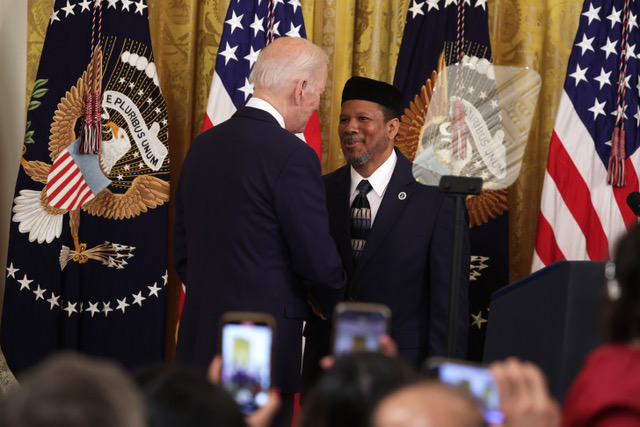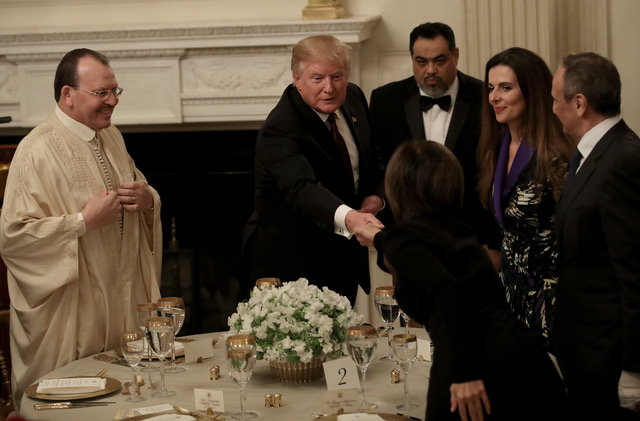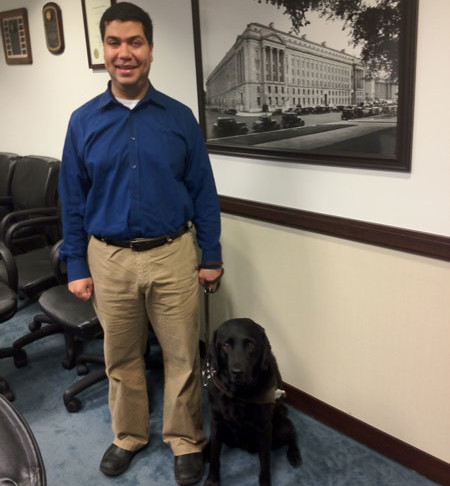The announcement was made official on Friday 14th April, while President Joe Biden was still in transit in the UK, that Mazen Baswari had been appointed as a senior advisor and White House Liaison to American Muslim Communities. The announcement fulfills a promise made during Biden’s electoral campaign, to reverse former President, Donald Trump’s cancellation of the role.
At the time of his 2020 campaign a message on the Biden-Harris website promised that as the US President, Joe Biden would:
‘start with restoring the White House Eid celebration and filling the position of Muslim American Liaison in the White House Office of Public Engagement, both eliminated by Donald Trump, to ensure a wide range of Muslim American voices are heard within his administration.’
Muslim groups across the US hail the appointment
Mazen Baswari, who is visually impaired and previously served as a trial attorney at the U.S. Department of Justice Civil Rights Division, has seen his appointment hailed by Muslim groups across the US as a hugely significant.
The National Deputy Director of the Council of American-Islamic Relations, Edward Ahmed Mitchell, speaking of the appointment said:
‘We welcome President Biden’s appointment of Mazen Baswari to the position of White House liaison to American Muslim communities…Mr. Baswari is one of our nation’s mostly accomplished and admired Muslim public servants, and his appointment is a positive step toward fulfilling President Biden’s pledge to building stronger relationships with the American Muslim community….We look forward to working with Mr. Baswari to address issues of concern to the American Muslim community, including institutional Islamophobia within federal law enforcement programs, the threat of hate crimes, and protecting religious freedom.’
The Muslim Public Affairs Council (MPAC) celebrated the appointment with a statement, which read:
‘With his extensive background in civil rights and advocacy, this is a great step forward in the push for Muslim representation and inclusion, and we are excited to see what Baswari brings to the role’
Reinstatement of the ‘The White House Iftar’
The US President had already fulfilled a promise after his election to host an Eid event at The White House in 2021, albeit a virtual one due to the Covid 19 pandemic. The following year in 2022, The White House hosted an in person Eid event in May. The restoration of the Eid event at The White House, which had been a tradition for over two decades, had been cancelled in 2016 by Donald Trump in advance of his so called ‘Muslim ban’, when he issued an executive order imposing a travel ban on visitors from Muslim-majority countries.

The legacy of the Trump Iftar cancellation
Back in 2018, as pressure mounted and the legal challenges to his notorious executive order dominated international headlines, as nationwide protests followed a Supreme Court ruling upholding his travel ban, Donald Trump announced that the Ramadan reception had been reinstated and would take place at the end of May of that year. Remarkably Trump chose not to invite (as had been the tradition for two decades) senior members and spiritual leaders of the American Muslim community to the event. Such invitees traditionally included figures such as Mohamed Magid, Imam of the All Dulles Area Muslim Society Center or Talib Shareef, President of the Nation’s Mosque which is the oldest mosque in Washington state, both of whom had always been in attendance at the event during previous administrations. Instead he restricted invitations to diplomats and foreign ambassadors from Muslim-majority countries, describing the event as being ‘for the Washington Diplomatic Community’. It was of note that the only two Muslim congress members – Keith Ellison and Andre Carson were also not invited.

At the time, the Islamic studies professor at the University of Notre Dame, Ebrahim Moosa had spoken of the significance of the Iftar reception introduced under the Clinton era, saying that it was intended to show how Muslims were an integral part of the social fabric of American society and:
‘The event hold deep symbolic meaning…with the highest office in the land recognising the holiest month on the Islamic calendar.’


















